#elisabeth charlotte d'orléans
Text
Liselotte's Favourite Childhood Christmas
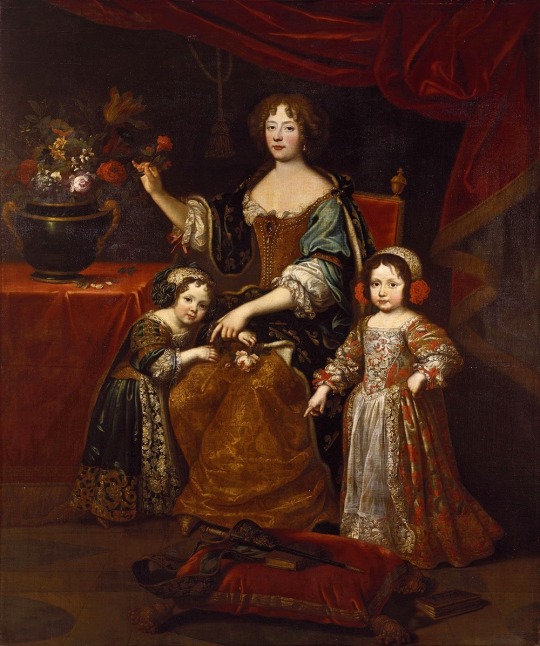
Liselotte von der Pfalz, Duchess of Orléans, with her two children Philippe and Elisabeth Charlotte, whom she wanted to experience the same Christmas festivities as she did as a child, c. 1678–1679 by Pierre Mignard.
A merry Christmas to all of you who celebrate (and of course an equally happy day to everyone who is currently celebrating a different holiday or none at all)!
Do you know that feeling of being nostalgic for the time when Christmas was a magical, festive season rather than a busy rush of obligations, get-together and worrying about presents, food and keeping all the relatives happy? You're not alone in that.
This year's Christmas post comes straight from the 17th century: on 11 December 1708, the Duchess of Orléans, more commonly known as Liselotte to her friends, family and posterity, recounted the magic of her favourite childhood Christmas, the last she spent in Hannover with her aunt Sophie (in the year 1660, I believe; Liselotte would have been 8 years old), to her daughter. Luckily, we still have the letter:
Ich weiß nicht, ob ihr auch jenes andere Spiel kennt, das man in Deutschland immer noch pflegt; man heißt es das Christkindl; dabei richtet man die Tische wie Altäre her und legt für ein Kind alle möglichen Sachen darauf, neue Kleider, Silber, Seidenbänder, Puppen, Naschereien und alles mögliche. Auf die Tische stellt man Buchsbäume, und auf jedes kleine Ästchen steckt man eine kleine Kerze: das sieht ganz wunderhübsch aus. [...] Ich erinnere mich, wie man in Hannover das letzte Mal das Christkindl zu mir kommen ließ: Man hat Schulbuben kommen lassen, die recht ordentlich eine Komödie spielen. Als erstes kommt der Stern und dann der Teufel und die Engel und schließlich der heilige Christ mit Petrus und den anderen Aposteln. Der Teufel schilt die Kinder und liest eine lange Liste mit ihren Untaten vor. Darauf sagt der Christ, daß er gekommen ist, sie zu beschenken, aber weil sie so böse sind, könne er nicht bei ihnen verweilen. Der Engel und der heilige Petrus bitten für sie und versprechen, daß sie sich bessern werden. Da vergibt Christus ihnen, und der heilige Petrus und der Engel führen sie zu den Tischen, die für sie bereitet sind [...]. Und als der heilige Petrus mich bei der Hand nahm -- es war ein kleiner Schuljunge mit einem falschen Bart --, da sah ich, dass er Krätze hatte, und daran merkte ich den Schwindel. [...] Und ganz bestimmt freue ich mich noch heute daran."
I don't know if you know that game which is still being maintained in Germany and called Christkindl [Christ Child]; they dress the tables, one for each child, in the style of an altar, and put all manner of things onto them, such as new clothing, silver, silk ribbons, dolls, sweets and much else. Onto the tables, they put little box trees, and on each little branch they place a little candle; it all looks very beautiful. I recall how they had the Christkindl visit me for the last time in Hannover: They had schoolboys come to act in a rather amusing comedy. At first, the star arrives, and then the devil and the angels and at last Christ with St. Peter and the other apostles. The devil scolds the children and reads a long list of their misdeeds to them. To this Christ replies that he has come to give them presents, but since they are so naughty, he cannot stay. The angel and St. Peter plead for them and promise that they will be good. Christ forgives them and St. Peter and the angel lead them to the tables which have been arranged for them [...]. And as St. Peter took me by the hand -- he was a little schoolboy with a false beard -- I remarked that he had scabies and saw through the sham. And without a doubt it still brings me joy until this day."
Sadly, this was to be the last Christmas of this sort Liselotte ever celebrated; her father, notoriously stingy to the point of arguing with his son's school at Heidelberg to lower the lunch fees citing poor young Karl's meagre appetite, was not one to indulge in grand festivities and when in France with children of her own, Liselotte, intent on bringing this favourite childhood tradition back for her own son and daughter, met with resistance from her husband. In a letter dated to January 1711 to Sophie von Hannover, the beloved aunt in whose home she had celebrated this favourite Christmas:
"hir weiß man gar nichts davon; wolte es introduciren, allein Monsieur sagte: 'Vous nous voulés donner de vos modes Allemandes pour faire de la despence, je vous baisse les mains'."
"They don't know nothing of it here; I wanted to introuce it, but Monsieur said 'You want to give us your German fashions [just to] create expenses, I kiss your hands."
So, young Philippe and Elisabeth Charlotte d'Orléans sadly never experienced the things that had made their mother's childhood Christmasses special, most crucially, they never had a Christmas tree, which would not arrive in France until after WWI.
To some degree, Liselotte's Christmas still exists materially; we know Christmas trees, presents still look very much the same, and there are holiday-themed plays both secular-ish and classic nativity plays put on by children, albeit luckily with a less harsh moral undertone.
But what's perhaps the most important, contrary to Philippe d'Orléans's fear of overspending is the aspect is to pass the joy of the festivities on, and share it with others because in the end, what's more precious than all the new clothes, silver, silk ribbons, dolls and sweets are the happy memories of the day.
Quotations taken from:
Dirk Van der Cruysse: Madame sein ist ein ellendes Handwerck. Liselotte von der Pfalz. Eine deutsche Prinzessin am Hof des Sonnenkönigs (1995), 4th edition 1997, p. 85 f.
#liselotte von der pfalz#philippe d'orléans#philippe ii d'orléans#elisabeth charlotte d'orléans#history#christmas#17th century
13 notes
·
View notes
Photo
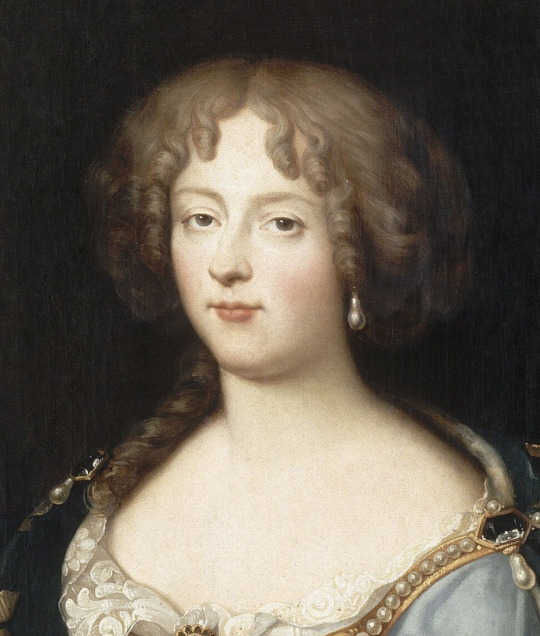
Elisabeth Charlotte of the Palatinate. By Jean Gilbert Murat.
#jean gilbert murat#royaume de france#maison d'orleans#bourbon orleans#elisabeth charlotte#duchesse d'orléans#house of wittelsbach#liselotte
7 notes
·
View notes
Text
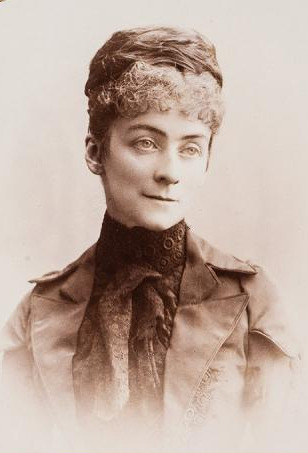

After having been betrothed to Ludwig II, King of Bavaria, Sophie Charlotte married the Duke of Alençon. Her life and its ending may be summed up in these few words: “ She died as nobly as she lived."
She perished, burnt alive in the terrible catastrophe of the Bazar de la Charité in Paris, in May 1897. The cinematograph was at that time a novel institution, and the operator, with inconceivable clumsiness, set fire to a room above the one in which the bazaar was held. The ceiling was all in flames before any attempt was made to clear the hall. There was a horrible struggle, in which the strongest had the advantage. However, among the men whose brutal selfishness seems to have stifled all chivalrous feeling, there were a few who thought of the Duchess. They hastened to her help, imploring her to escape, even trying to drag her away by force; but she refused. “I shall stay to the last,” she replied. “Save the others first.” Some Sisters of the Order of S. Vincent de Paul would not leave her, determined to sacrifice their lives also, if need be. The Duchess remained standing; the Sisters knelt round her, praying. As the fire drew close to her she loosened her magnificent hair, which covered her like a cloak. And it was so that those who survived the disaster saw her for the last time.
Laurent, Lea (1916). Our Lady Of Belgium (translation by Elisabeth M. Lockwood)
ON THIS DAY, IN 1897, SOPHIE CHARLOTTE, DUCHESS OF ALENÇON (NEÉ DUCHESS IN BAVARIA), DIED IN THE FIRE OF THE BAZAR DE LA CHARITÉ. She was the youngest daughter of Maximilian, Duke in Bavaria, and his wife Princess Ludovika of Bavaria, and therefore a sister of Empress Elisabeth of Austria. She was briefly engaged to her cousin King Ludwig II of Bavaria in 1867, however the King had no interest in marriage at all and eventually called it off. Less than a year later Sophie married Ferdinand d'Orléans, Duke of Alençon, a grandson of Louis Phillipe, the last King of the French. They had two children, Louise and Emmanuel.
In the later years of her life Sophie did plenty of charity work. The Bazar de la Charité was an annual charity event held in Paris since 1885, in which many different items were sold. The tragic accident that set the place on fire in May 1897 took the lives of 126 victims, many of them aristocratic women, the Duchess of Alençon being the most prominent of them. Sophie's body was so damaged that only her dentist could identify her by her teeth (something unprecedented in France that led to a breakthrough in forensic odontology). Her remains rest in the Chapelle royale de Dreux, the traditional burial place of the members of the House of Orléans.
#:(((((#sophie in bavaria duchesse d'alençon#house of wittelsbach#historicwomendaily#author: lea laurent#on this day in history
112 notes
·
View notes
Text
THIS DAY IN GAY HISTORY
based on: The White Crane Institute's 'Gay Wisdom', Gay Birthdays, Gay For Today, Famous GLBT, glbt-Gay Encylopedia, Today in Gay History, Wikipedia, and more …


1372 — England: King Edward II is killed. The King was rumored to have had an affair with Hugh Despenser. Edward also had a close and controversial relationship with Piers Gaveston who had joined his household in 1300. The precise nature of Edward and Gaveston’s relationship is uncertain; they may have been friends, lovers or sworn brothers.


1640 – Philippe I, Duc d'Orléans (d.1701) was the second son of Louis XIII of France and Anne of Austria, and thus the younger brother of Louis XIV of France. He was known as Monsieur at the French court, Monsieur becoming the traditional name of the King's eldest brother from 1660. He was born at St Germain-en-Laye.
In 1661, he was made Duke of Orléans, and married his first cousin Henrietta Anne Stuart, sister of Charles II of England, also known as 'Minette'.
Traditionally, in the French court, a king's younger son was not given significant responsibility, and Philippe was no exception. His mother discouraged him from traditionally male pursuits such as arms and politics, and encouraged him to wear dresses, make-up, and to enjoy traditionally feminine pursuits. This was part of Queen Anne's effort to distract Philippe from challenging his older brother's rule and position.
As an adult, Monsieur continued to enjoy wearing feminine clothing and fragrances, but also proved to be a brave and competent commander in the field. He fought with distinction in the 1667 promenade militaire against Flanders during the War of Devolution, though he hastened back to his life at court immediately after victory was assured. Monsieur resumed military command in 1672, and in 1677 won a great victory at the Battle of Cassel and took St Omer. Louis XIV, it was said, was jealous of his brother's success, therefore Monsieur never commanded an army again.
Monsieur's favorites, invariably handsome young men, dominated contemporary and historical commentary about his role at court, particularly one man who shared his princely rank and much of his life: Philip of Lorraine-Armagnac was three years younger than Philip of Orléans. Handsome, brutal and devoid of scruples, he was the great love of Monsieur's life. He was also the worst enemy of Monsieur's two wives...
As greedy as a vulture, this cadet of the French branch of the house of Lorraine had, by the end of the 1650s, hooked Monsieur as though harpooning a whale. The young prince loved him with a passion that worried Madame Henrietta and the court bishop, Cosnac, but the King understood that, thanks to the attractive face and sharp mind of the good-looking cavalier, he would have his way with his brother.
Under these circumstances it is no surprise that Monsieur's first marriage was unhappy. In January 1670 his wife prevailed upon the King to imprison the chevalier, first near Lyon, then in the Chateau d'If, and finally banish him to Rome. But by February Monsieur's protests and pleas persuaded the King to restore him to his brother's entourage. The death of the Duchess in the following June was popularly attributed to poison.
His second arranged marriage was to 'Liselotte' Elisabeth Charlotte, daughter of Charles Louis, Elector Palatine of the Rhine Whereas Monsieur's first wife had been known for beauty, charm and wit, no one accused Liselotte of those graces, and some said that this lack explained why she fared better with Monsieur than did his first wife. She gave him his only surviving son. She also became known for her brusque candour, upright character, lack of vanity, and prolific foreign correspondence about the daily routine and frequent scandals of Versailles.
Monsieur failed to stand up to Louis XIV's insistence on marrying his daughter Françoise Marie Monsieur's son and heir, Philippe d'Orléans. But when, years later, the King rebuked him for his son's indifference toward her, Monsieur defended his son with such vehemence that a footman felt obliged to enter the King's chamber to warn the royal brothers that their argument was being overheard by the entire court. Monsieur is the only man known to have raised his voice to the adult Louis XIV— though he did not live to see the King again.
Monsieur was an art collector and perhaps also a shrewd investor. Monsieur enjoyed court life, gambling, chasing young men, and ceremony. Despite the fact that his debts and dalliances often cost the King, the brothers spent much time together. Orléans' loyalty was never in question; but his unabashed effeminacy probably deprived him of the credit he deserved among his countrymen and in history. Louis XIV, however, seems to have fully appreciated their relationship, as he treated Monsieur, publicly and privately, with respect and leniency.
He died at Saint-Cloud in 1701 of an apoplectic fit brought on by his heated argument with the King.

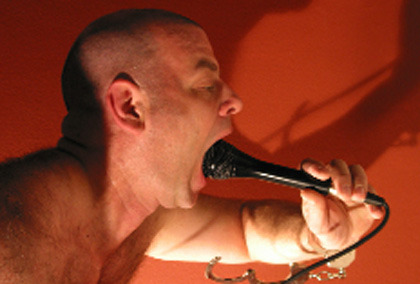
1968 – John Patrick Kamys, born in Chicago, IL, and better known by his stage name Jinx Titanic is an American composer, singer, songwriter, recording artist, and author, best known for his outrageous stage persona, and image as the beer-swilling, cigar-smoking, sexually-candid, lead singer of the eponymous rock band. Occasionally he will appear as a stage actor, movie actor, comedian, television personality, or host, and is also considered a notable member of the Queercore and Homocore movements.
Before taking on the persona and public life of Jinx Titanic, Kamys worked regularly in Chicago as a composer and songwriter. His first score for theater was written in 1994 for Teatro Vista's production of Romulus Linney's play Ambrosio.
In 1999, he also wrote and played the lead (Logan John) in the alt-country/Americana musical Future City Homosexual Tells All "about a small town boy trying to do the big town thing." at The Theater Building in Chicago.
Jinx Titanic, was born in May 2002 at a recording session at Chicago's Rax Trax Studios. Kamys had assembled four musicians to record under the band name Super 8 Cum Shot. He described the band as a "good-natured, bawdy and unforgettable punk/party/porno/pop experience," and dubbed its members, "the beer-swilling ambassadors of the orgasm." In keeping with the spirit of the band, each member was asked to choose a pseudonym. Kamys chose Jinx Titanic for himself. Super 8 Cum Shot Volume I was released July 31, 2002 with a performance and party at the historic Whisky a Go Go in Los Angeles, California. The original members of Super 8 Cum shot, performing on the recording are: John Kamys aka Jinx Titanic vocals, Jeff Kust aka G.I. Tarbaby Barbra guitar, Mitch Marlow aka Machine Gun Garafalo guitar, Chris Sewell aka Dax Malkovich bass, Timothy Ford aka Posey (t-mint) Parker drums.
In January 2005, Titanic, who is openly bisexual, was invited to play the Queer Lounge at the Sundance Film Festival. This event marked the beginning of his affiliation with the Q Television Network, and in June 2005 he began working as a guest host and regular correspondent for the network, continuing to do so until Q Television closed its doors in late 2006. During this period, while retaining a band, Titanic repositioned himself as the solo artist Jinx Titanic.


1983 – Scott Evans is an American actor, best known for his role as the police officer Oliver Fish on the ABC daytime soap opera One Life to Live. He is the younger brother of actor Chris Evans (Johnny Flame in The Fantastic Four; Captain America).
Evans began playing the recurring role of police officer Oliver Fish on One Life to Live on January 15, 2008. He subsequently appeared briefly on Guiding Light as Trey in 2008, and guest-starred as Woody Sage in the June 22, 2008 Law and Order: Criminal Intent episode "Betrayed" as well as the role of Ben in the October 21, 2008 Fringe episode "The Cure." Evans was also seen as Chad the Mail Clerk in the 2009 film Confessions of a Shopaholic.
Initially brought in to One Life to Live for five episodes, Evans returned several times. In July 2009, his character Oliver Fish became involved in a romantic relationship with another man. The storyline came to wider attention when Patricia Mauceri, an actress who had played a recurring role on the One Life to Live since 1995, was replaced after reportedly voicing personal religious objections to her character's involvement in his storyline. The Fish storyline on One Life to Live was canceled and Scott was let go. Evans was later outted as gay by his brother Chris.
Scott said of coming out:
You know, I have to tell you, I don't think I ever really had a thought process about being an out actor. I came out when I was 19-years-old, and then I became an actor. I didn't want to be one of those people who goes back into the closet and tries to hide because I knew it would come out. With the success of my brother, I didn't feel it was necessary to hide it once I'd come out. I'm an out person, as opposed to an out actor, I suppose.

1998 – “Will & Grace,” the first prime-time program to feature openly gay lead characters, premiers.

2003 – Soldier’s Girl, a film based on a true story about solider in love with a transsexual woman, is nominated for an EMMY.

2010 – Dan Savage and husband Terry Miller upload their first It Gets Better video on YouTube, to help prevent suicide among LGBT youth. Dan is an American author, media pundit, journalist, and activist for the LGBT community. He writes Savage Love, an internationally syndicated relationship and sex advice column. He has also worked as a theater director, sometimes credited as Keenan Hollahan.


2 notes
·
View notes
Text
youtube
Petit rappel que le frère de Louis XIV, Philippe d'Orléans, était très très gay, a passé sa vie avec son amant Philippe, Chevalier de Lorraine (et d'autres favoris) malgré son premier mariage à sa cousine Henriette d'Angleterre et son deuxième mariage avec Elisabeth-Charlotte, princesse Palatine.
#gay#homosexual#happy pride#queers de france#French and LGBTQ+#philippe d'orléans#monsieur#chevalier de lorraine#monchevy#versailles canal+#Youtube
4 notes
·
View notes
Text
Elizabeth ' Bettie ' Pollard and Elisabeth Charlotte ' Liselotte ' von der Pfalz d'Orléans.
Two ladies with the same first names and both as different as the fourth letters - - -

Eli-z-abeth ; sharp and angular and has the studied Pollard tongue that can stab as sharply as those angles in the letter--

Eli-s-abeth ; just as smart and well spoken but softer like the comfortable curves of the letter--
#muse;[liselotte]#muse;[bettie]#i love them...#i wanted this to be more insightful but?? brickwork for another time atleast
1 note
·
View note
Text
I want to re-watch Versailles...but my DVDs are in Paris x) I want to see Philippe, Chevalier and Liselotte please (not Louis, I hate him)
#versailles#versailles tv series#monchevy#philippe d'orléans#chevalier de lorraine#elisabeth-charlotte de bavière
30 notes
·
View notes
Photo
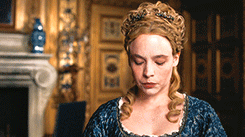

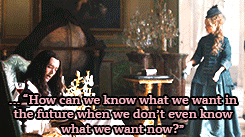


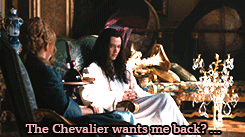

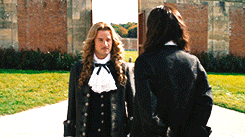

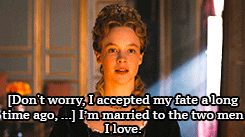
King Louis The Great (XIV)/François de La Rochefoucauld vs. Princess QUEEN ‘Liselotte’ Palatine and her husbands* - saving one of their lives, restoring the other’s sense of belonging, and defiantly securing her own - in “The Legacy”
Bonus:
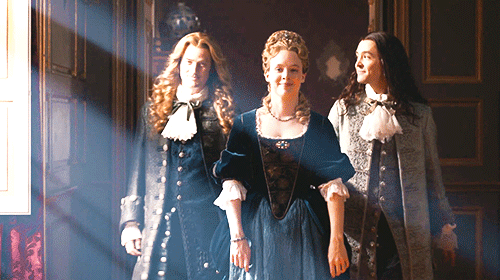
#versailles#monchelotte#monchevy#madame palatine#monsieur philippe d'orléans#chevalier de lorraine#princess palatine#prince philippe#elisabeth charlotte 'liselotte' palatine#duke of orléans#elisabeth charlotte palatine#liselotte palatine#liselotte von der pfalz#philippe d'orléans#philippe i#philippe de lorraine#louis xiv#françois de la rochefoucauld#scarron#françoise d'aubigné#marquise de maintenon#philippe to the 2nd#philippe x lorraine#philippexlorraine#philippelorraine#lorraine x philippe#lorrainexphilippe#lorrainephilippe#gif
746 notes
·
View notes
Photo

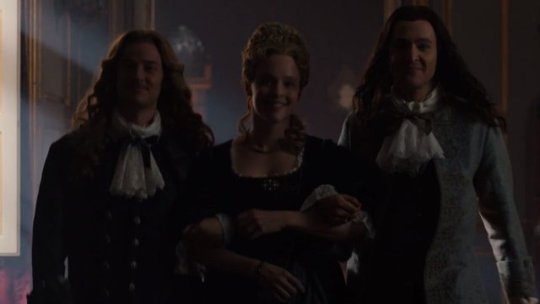
#monchevy#monchelotte#philippe d'orléans#chevalier de lorraine#elisabeth charlotte of the palatinate
373 notes
·
View notes
Text
youtube
I really think this is genuinely a nice little love song, very catchy to boot, but the first verse always makes me chuckle because, well...
We could walk along the Seine
Paris in the April rain
Say the magic words "Je t'aime"
Monsieur and Madame
[...]
...I am picturing Philippe and Elisabeth Charlotte d'Orléans eyeing each other with disgust, he meaningfully flashing a hand with large rings on every finger putting a conventional knuckle-duster to shame while she, smiling, polishes a hunting rifle with the hem of her gown.
I know it's unintentional, but the phrase Monsieur and Madame, which, you know, is just what you'd address any couple made up of a man and a woman in French, has been completely and utterly tied to these two in my brain, which kind of ruins the mood of the song, albeit in a humorous way.
#history humour#utter nonsense#r rambles#liselotte#liselotte von der pfalz#philippe d'orléans#17th century#Youtube
8 notes
·
View notes
Photo
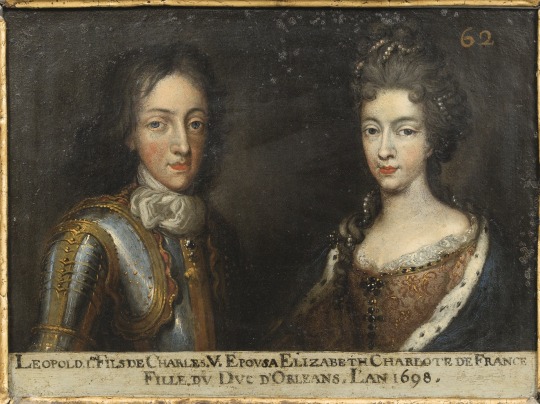
Leopold, Duke of Lorraine, and his wife Elisabeth-Charlotte d'Orléans. Unknown artist.
7 notes
·
View notes
Photo
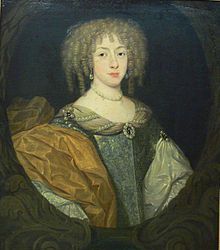


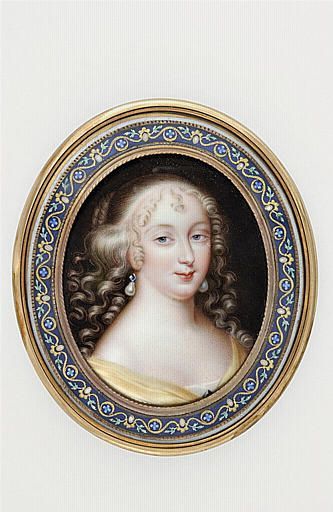
“Elisabeth-Charlotte, who married in 1671 Monsieur, brother of Louis XIV, was born at Heidelberg in 1652. Her father, Charles-Louis, was that Elector of the Palatinate who was restored to his States by the Peace of Westphalia. From childhood Elisabeth-Charlotte was noted for her lively mind, and her frank, open, vigorous nature. Domestic peace had never reigned about the hearth of the Elector-Palatine; he had a mistress, whom he married by the left hand, and the mother of Ehsabeth-Charlotte is accused of having caused the separation by her crabbed temper.
The young girl was confided to the care of her aunt Sophia, Electress of Hanover, a person of merit, for whom she always retained the feelings and gratitude of a loving daughter. To her she addressed her longest and most confidential letters, which would certainly surpass in interest those that are published, but M.Menzel states that it is not known what became of them.
All that part of the life and youth of Madame would be curious and very useful to recover. "I was too old," she says, "when I came to France to change my character; the foundations were laid." While subjecting herself with courage and resolution to the duties of her new position she kept her German tastes; she confesses them and proclaims them before all Versailles and all Marly; and the Court, then the arbiter of Europe, to which it set the tone, would certainly have been shocked if it had not preferred to smile.
From Marly after forty-three years' residence in France, Madame writes (November 22, 1714): "I cannot endure coffee, chocolate, or tea, and I do not understand how anyone can like tliem ; a good dish of sauerkraut and smoked sausages is, to my mind, a feast for a king, to which nothing is preferable; cabbage soup with lard suits me much better than all the delicacies they dote on here." In the commonest and most every-day things she finds another and a poorer taste than in Germany.
She loved nature, the country, a free life, even a wild one; the impressions of her childhood returned to her in whiffs of freshness. Apropos of Heidelberg, rebuilt after the disasters, and of a convent of Jesuits, or Franciscans, established on the heights.
"Mon Dieu! " she cries, "how many times I have eaten cherries on that mountain, with a good bit of bread, at five in the morning! I was gayer then than I am to-day."
The brisk air of Heidelberg is with her after fifty years' absence; and she speaks of it a few months before her death to the half-sister Louise, to whom she writes: "There is not in all the world a better air than that of Heidelberg; above all, about the chateau where my apartment is; nothing better can be found."
In Germany, on the banks of the IsTeckar and the Rhine, Elisabeth-Charlotte enjoyed the picturesque sites, her rambles through the forests, Nature left to herself, and also the spots of bourgeois plenty amid the wilder environment.
"I love trees and fields more than the finest palaces, in a word, all that is natural is infinitely more to my taste than works of art or magnificence; the latter only please at first sight; as soon as one is accustomed to them they fatigue, and we care no more about them."
In France she was particularly fond of residing at Saint-Cloud, where she enjoyed Nature with greater liberty. At Fontainebleau she often walked out on foot and went a league through the forest. On her arrival in France and first appearance at Court, she told her physician when presented to her that "she did not need him; she had never been bled or purged, and when she did not feel well she always walked six miles on foot, which cured her." Mme.de Sévigné, who relates this, seems to conclude, with the majority of the Court, that the new Madame was overcome with her grandeur and spoke like a person who is not accustomed to such surroundings. Mme.de Sévigné is mistaken; Madame was in no degree overcome by her greatness. She felt herself born for the high rank of Monsieur's wife, and would have felt in her right place if higher still.
The role that Madame conceived for herself in France was that of preserving her native country from the horrors of war, and of being useful to it in the different schemes which agitated the Court of France and might in the end overthrow it. In this she failed; and the failure was to her a poignant grief. She was even made the innocent cause of fresh disasters to the land she loved when, on the death of her father and her brother (who left no children), Louis XIV. set up a claim to the Palatinate on her account.
Instead of bringing pledges and guarantees of peace, she found herself a pretext and a means for war. The devastation and the too famous incendiarism of the Palatinate which the struggles of ambition brought about caused her inexpressible grief.
"When I think of those flames, shudders run over me. Every time I try to go to sleep I see Heidelberg on fire, and I start up in bed, so that I am almost ill in consequence." She speaks of this incessantly, and bleeds and weeps for it after many years.”
[...] When she arrived in France at the age of nineteen no one expected all this. The Court was filled with memories and regrets for the late Madame, the amiable Henrietta, snatched away in the bloom of her charm and grace.
"Alas!" cries Mme. de Sévigné, speaking of the new-comer, "alas ! if this Madame could only represent to us her whom we have lost!"
In place of a blithesome fairy and a being of enchantment, what was it that suddenly appeared before them?
"Madame," says Saint-Simon, "was a princess of the olden time; attached to honour, virtue, rank, grandeur, and inexorable as to their observances. She was not without intellect; and what she saw she saw very well. A good and faithful friend, trusty, true, and upright ; easy to prejudice and shock; very difficult to bring back from prejudice; coarse, and dangerous in her public outbursts; very German in her habits; frank, indifferent to all propriety and all delicacy for herself and for others; sober, solitary, and full of notions. She loved dogs and horses, hunting and theatres passionately, and was never seen except in full dress or in a man's wig and riding-habit."
He concludes his portrait admirably in these words: "The figure and rusticity of a Swiss, but capable with all of a tender and inviolable friendship."
Introduced at Court by her aunt, the illustrious Princess Palatine, Anne of Gonzaga, in nothing was she in keeping with it,— neither in spirit, nor in the gifts of insinuation and conciliatory conduct, nor in caution. Succeeding the first Madame, she seemed even farther aloof from it, more completely a contrast in manners, in the quality and turn of her thoughts, in delicacy, in short, in everything.
Madame, throughout her life, was, and must necessarily have been, the contrary of many things and many persons about her; she was original, at any rate, and in all ways herself.”
Introduction. “The correspondence of Madame, Princess Palatine, mother of the regent; Marie-Adelaide de Savoie, duchesse de Bourgogne and of Madame de Maintenon, in relation to saint-eve.” Contains introductions made by C.-A Sainte-Beuve. Selected and translated by Katherine Prescott Wormeley. 1899.
#Liselotte#Elisabeth-Charlotte#Duchess of Orléans#Duchesse de Orléans#Princess of the Palatinate#Princesse du Palatinat#Monsieur#Philippe I#Duc d'Orléans#Duke of Orléans#Louis XIV#King Louis XIV#House of Orléans#House of Bourbon#France#17th century#18th century#Versailles
51 notes
·
View notes
Photo
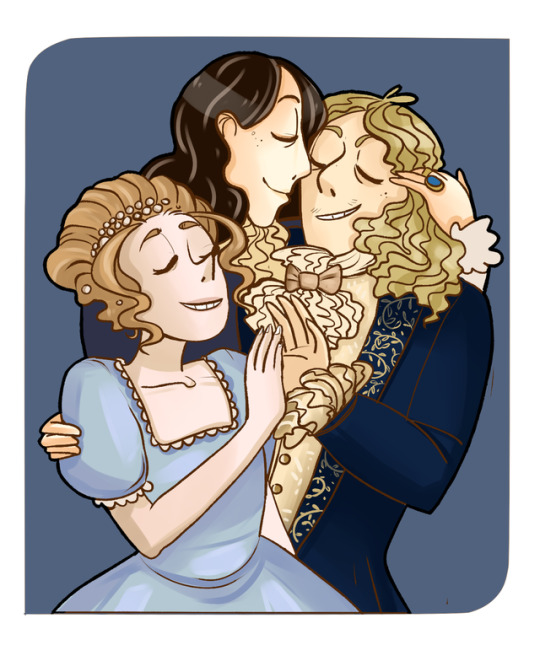
78 notes
·
View notes
Note
"Elisabeth Charlotte D'Orléans." Somehow that's said with so much emphasis without Emily shouting (she rarely does). She did also just drop from a ledge to land directly in front of Lise. It hasn't been said, but let it be known that it would absolutely break her heart if something ever happened to Lise and that is always the reason she'd formally like an update on destinations.
@ofvoidx sent a THING and tbh half of the time I'm not sure what Liselotte's actual last name is - still accepting!!
Liselotte is usually only met with silence when she takes a turn through the gardens this late at night. The distinct words ( barely above a whisper ) slice through the obsidian air and the Princess let's out a shout, shoving the small lantern up and towards the taller figure. Her free hand grasps at the heavy fabric of her night dress ( and to make sure her heart has not toppled out of her chest ) and the fingers dig in deep, Liselotte already knowing her destination of a midnight tour will be met with disapproval.
" Emily, " Liselotte says back and uses what strangled strength is left in her voice after this surprise, " Do not scold me about this. You already have two guards posted outside my doors - - - " ( and she's hoping the Empress will miss the fact that Liselotte may have climbed out her own window. )
#ofvoidx#rp;[liselotte]#meanwhile emily: absolutely watched her idiot girlfriend crawl out her own window bc she apparently needs to walk around the garden at 3am
1 note
·
View note
Photo






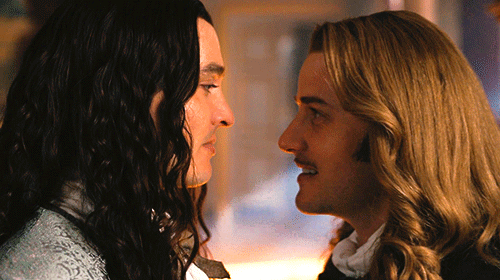
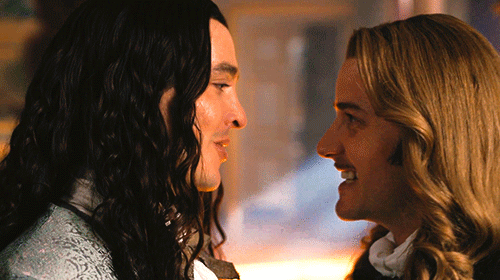
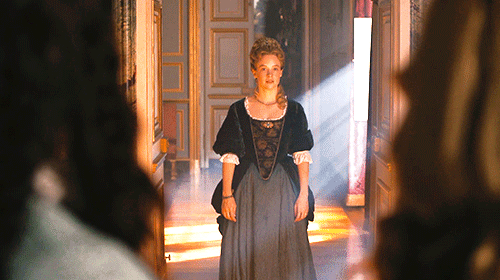

“... You’ve never said it ...”
“... I will if you will ...”
“Alright”
---------------------
“... We--We were just-- ...”
“I know what you were doing”
“... There’s always a place for you here, Liselotte, ...”
“... Don't worry, I accepted my fate a long time ago, ...”
Bonus (again):
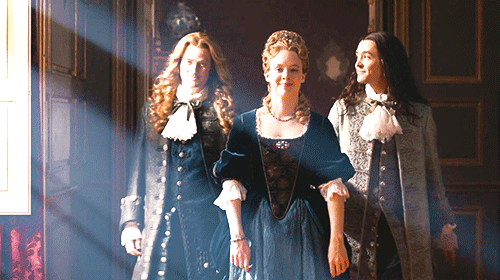
#versailles#monchelotte#monchevy#monsieur philippe d'orléans#chevalier de lorraine#madam palatine#prince philippe#philippe de lorraine#princess palatine#elisabeth charlotte 'liselotte' palatine#duke of orléans#elisabeth charlotte palatine#liselotte palatine#liselotte von der pfalz#philippe d'orléans#philippe i#philippe to the 2nd#philippe x lorraine#philippexlorraine#philippelorraine#lorraine x philippe#lorrainexphilippe#lorrainephilippe#gif
497 notes
·
View notes